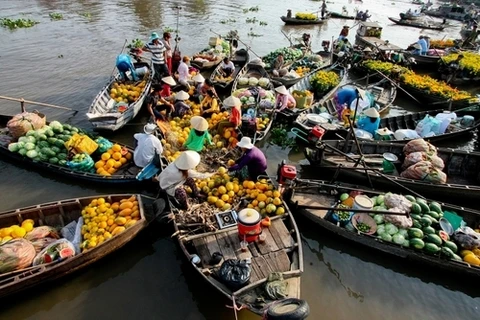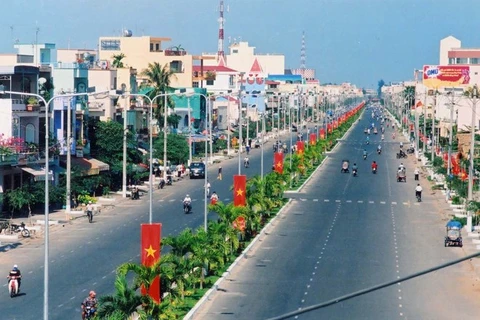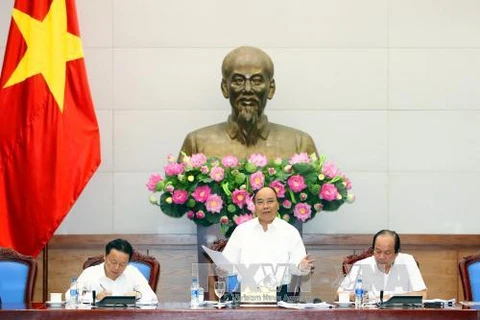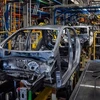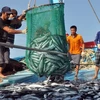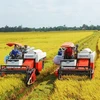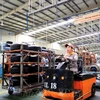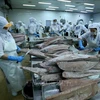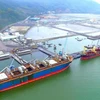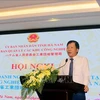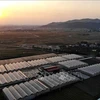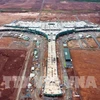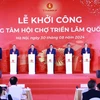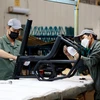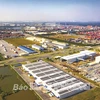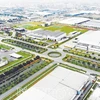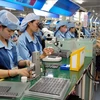Can Tho (VNA) – Deputy Prime Minister Vuong Dinh Hue has called for stronger participation of the business circle and people in sustainable and climate-resilient development of the Mekong Delta.
In his opening remarks at the Conference on Sustainable and Climate-Resilient Development of the Mekong Delta in Can Tho city on September 26, the Deputy PM appealed to international donors and organisations to continue providing appropriate technical and financial support for the region.
He also underlined the need to further carry forwards the role played by the Mekong River Commission and use Mekong River water resources sustainably, for regional prosperity.
Deputy PM Hue urged the delegates to the conference to fully analyse challenges posed by climate change, the development process of the Mekong Delta and the use of water resources from upstream Mekong River while identifying short and long-term opportunities and forecasting major impacts on regional development.
The move aims to shape a development model as well as major transitional orientations for the Mekong Delta, he stressed.
Besides, attention should be paid to breakthrough reform policies and mechanisms to spur the transform and sustainable development of the delta, focusing on mechanisms on land, tax, market construction, trade promotion, science-technology and human resources development, Hue said.
He asked the delegates to define priority projects, tasks and programmes with the participation of the Government, localities, domestic and foreign organisations, especially residents and enterprises in the Mekong Delta and adjacent localities, particularly Ho Chi Minh City.
The Deputy PM stressed that encompassing one city and 12 provinces with a total area of 3.94 million ha and a population of 17.5 million, the Mekong Delta plays an important role in the national economy.
This is one of the deltas that have the largest agricultural output in Southeast Asia and Vietnam, contributing 54 percent of rice output, 70 percent of aquatic production and 36.5 percent of fruit amount to the country. Up to 90 percent of rice exports and 65 percent of seafood shipments of Vietnam come from the delta.
However, the Mekong Delta is one of the four deltas hardest hit by climate change and sea level rise.
“The Mekong Delta has faced many severe impacts of climate change, sea level rise and extreme weather patterns,” Deputy PM Hue said, pointing out limitations in the use of Mekong water resources, the regional development model and State management in the region.
Such impacts have created big challenges and threats to the development of the Mekong Delta, livelihoods and daily lives of people in the delta in particular and Vietnam in general, thus affecting the development of the region and the world at large, especially food security, he said.
Given this, the Government and the Prime Minister decided to hold the conference, aiming to set forth a vision for sustainable and prosperous development of the Mekong Delta in close connection with the country’s key economic regions and the Greater Mekong Sub-region.
During the first working day, the delegates focused their discussions on challenges, opportunities and solutions to transform the development model of the Mekong Delta; integrated planning, infrastructure development and regional coordination mechanism; sustainable agricultural development, irrigation infrastructure and natural disaster response; and human resources mobilisation and coordination.
Prime Minister Nguyen Xuan Phuc is expected to chair the September 27 working session.
Outcomes of the conference will serve as a foundation for the Government to issue a resolution on sustainable and climate-resilient development in the Mekong Delta.-VNA
In his opening remarks at the Conference on Sustainable and Climate-Resilient Development of the Mekong Delta in Can Tho city on September 26, the Deputy PM appealed to international donors and organisations to continue providing appropriate technical and financial support for the region.
He also underlined the need to further carry forwards the role played by the Mekong River Commission and use Mekong River water resources sustainably, for regional prosperity.
Deputy PM Hue urged the delegates to the conference to fully analyse challenges posed by climate change, the development process of the Mekong Delta and the use of water resources from upstream Mekong River while identifying short and long-term opportunities and forecasting major impacts on regional development.
The move aims to shape a development model as well as major transitional orientations for the Mekong Delta, he stressed.
Besides, attention should be paid to breakthrough reform policies and mechanisms to spur the transform and sustainable development of the delta, focusing on mechanisms on land, tax, market construction, trade promotion, science-technology and human resources development, Hue said.
He asked the delegates to define priority projects, tasks and programmes with the participation of the Government, localities, domestic and foreign organisations, especially residents and enterprises in the Mekong Delta and adjacent localities, particularly Ho Chi Minh City.
The Deputy PM stressed that encompassing one city and 12 provinces with a total area of 3.94 million ha and a population of 17.5 million, the Mekong Delta plays an important role in the national economy.
This is one of the deltas that have the largest agricultural output in Southeast Asia and Vietnam, contributing 54 percent of rice output, 70 percent of aquatic production and 36.5 percent of fruit amount to the country. Up to 90 percent of rice exports and 65 percent of seafood shipments of Vietnam come from the delta.
However, the Mekong Delta is one of the four deltas hardest hit by climate change and sea level rise.
“The Mekong Delta has faced many severe impacts of climate change, sea level rise and extreme weather patterns,” Deputy PM Hue said, pointing out limitations in the use of Mekong water resources, the regional development model and State management in the region.
Such impacts have created big challenges and threats to the development of the Mekong Delta, livelihoods and daily lives of people in the delta in particular and Vietnam in general, thus affecting the development of the region and the world at large, especially food security, he said.
Given this, the Government and the Prime Minister decided to hold the conference, aiming to set forth a vision for sustainable and prosperous development of the Mekong Delta in close connection with the country’s key economic regions and the Greater Mekong Sub-region.
During the first working day, the delegates focused their discussions on challenges, opportunities and solutions to transform the development model of the Mekong Delta; integrated planning, infrastructure development and regional coordination mechanism; sustainable agricultural development, irrigation infrastructure and natural disaster response; and human resources mobilisation and coordination.
Prime Minister Nguyen Xuan Phuc is expected to chair the September 27 working session.
Outcomes of the conference will serve as a foundation for the Government to issue a resolution on sustainable and climate-resilient development in the Mekong Delta.-VNA
VNA

